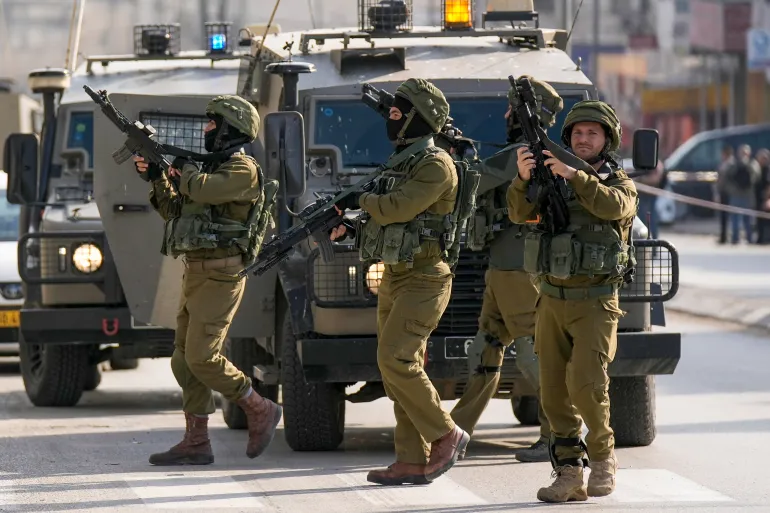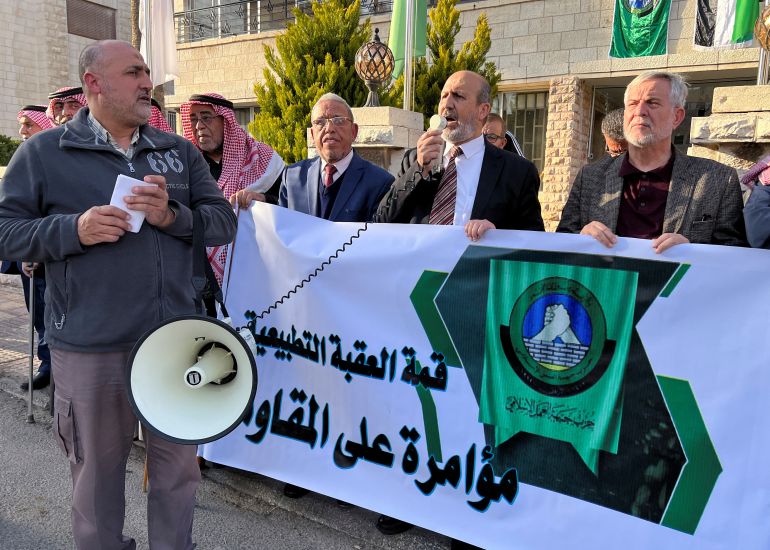
Israel and Palestinians agree steps to curb violence
Israel has agreed to stop the authorisation of illegal settlement outposts in the occupied West Bank for six months, a joint statement says.

Israeli and Palestinian officials have pledged to implement measures to de-escalate surging violence after talks in Jordan.
In a joint statement at the end of the meeting in the Red Sea resort of Aqaba on Sunday, Israeli and Palestinian officials said that they would work closely to prevent “further violence” and that they “reaffirmed the necessity of committing to de-escalation on the ground”.
Israel was committed to stop “discussing setting up any new settlement units for four months and stop approving any new settlements for six months”, a joint statement said.
After “thorough and frank discussions”, the Palestinian and Israeli sides “reaffirmed the need to commit to de-escalation on the ground and to prevent further violence”, it said.
The joint statement came at the end of a meeting also attended by US, Egyptian and Jordanian officials amid growing concerns over an escalation of violence in the run-up to the holy Muslim month of Ramadan that begins in late March.

Israel and the Palestinian Authority stressed “joint readiness and commitment to work immediately to stop unilateral measures” for three to six months, according to the statement.
Host nation Jordan, along with Egypt and the US, considered “these understandings as major progress towards re-establishing and deepening relations between the two sides”, the statement said.
White House National Security Adviser Jake Sullivan in a statement said the US recognised the meeting was a “starting point”.
“There is much work to do over the coming weeks and months to build a stable and prosperous future for Israelis and Palestinians alike,” Sullivan said of the Aqaba meeting. “Implementation will be critical.”
The two sides also agreed to meet again next month in Sharm el-Sheikh in Eqypt.
The Hamas group, which governs the besieged Gaza Strip, condemned the West Bank-based Palestinian Authority for taking part. An official from the group said the meeting was “worthless” and would not change anything.
The ruling Fatah movement of Palestinian President Mahmoud Abbas had earlier defended the meeting.
“The decision to take part in the Aqaba meeting despite the pain and massacres being endured by the Palestinian people comes from a desire to bring an end to the bloodshed,” it said on Twitter.
Israel’s Finance Minister Bezalel Smotrich, who also has responsibilities over Israeli settlements in the West Bank, quickly said he would not abide by any agreement on freezing settlement construction.
“I have no idea what they spoke about or not in Jordan,” Smotrich wrote on Twitter. “But one thing I do know: there will not be a freeze on the building and development in settlements, not even for one day (it is under my authority).”
Reporting from West Jerusalem, Al Jazeera’s Sara Khairat said that while this meeting saw the Israeli side meet with the Palestinian Authority, it was “much to the discontent of many Palestinians who have said these meetings result to in absolutely nothing.”
“Also with the new right-wing government, there has been a step up in demolitions and raids on occupied territories including the West Bank and Jerusalem.
“They [officials at the meeting] agreed to de-escalate tensions and maintain security at the Al-Aqsa Mosque compound, but since that statement, Israeli Prime Minister Benjamin Netanyahu has tweeted saying that settlements won’t be frozen, which seems to be contradicting to the statement that was released from the meeting in Jordan.”
Nablus violence
The talks were held on the same day two Israelis were shot and killed in the occupied West Bank in what the Israeli government called a “Palestinian terror attack”.
The fatal shooting came days after Israeli forces launched their deadliest raid in the West Bank in nearly 20 years, which left 11 Palestinians dead in the northern city of Nablus.
Prime Minister Benjamin Netanyahu’s return to power at the head of one of the most right-wing coalitions in Israeli history has added to Arab concerns about escalation.
Israel on February 12 granted retroactive authorisation to nine Jewish settler outposts in the occupied West Bank and announced the mass construction of new homes within established settlements.
The United Nations Security Council issued a formal statement denouncing Israel’s plan to expand settlements on occupied Palestinian territory – its first action of the kind against Israel in six years.
The occupied West Bank is home to about 2.9 million Palestinians plus an estimated 475,000 Israelis who live in state-approved settlements considered illegal under international law.
Israeli forces have killed 65 Palestinians, including 13 children, this year so far. They have also injured hundreds of others, making the first two months of 2023 the deadliest for Palestinians compared with the same period since 2000.
Eleven Israeli civilians, including three children, a police officer and one Ukrainian civilian have been killed over the same period, according to the AFP news agency.
Israel has occupied the West Bank since the Six-Day War of 1967.







